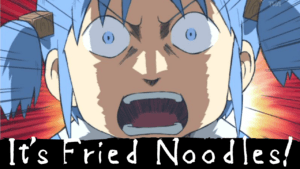Let’s learn Japanese with Dio Brando’s quote from JoJo’s Bizarre Adventure (Jojo no Kimyou na Bouken, ジョジョの奇妙な冒険).
CONTENTS
Video
Dio Brando’s Quote
Japanese: おまえは今まで食ったパンの枚数を覚えているのか?
Romaji: omae wa imamade kutta pan no maisū o oboete iru noka?
English: How many breads have you eaten in your life?
Analysis
おまえ (pronoun) is a rough way of saying “you”. You need to be very careful using this word as it could be friendly or offensive depending on the relationship between you and the listener so it’s better not to use おまえ in real life.
The は particle shows the preceding noun is the topic of the sentence. So おまえは is like “as for you” or “with regard to you”.
今まで (adverb) :今 means “now” and まで means “until” so 今まで means “until now”, “so far” or “up to this time”.
食った means “ate”. It’s the past tense of the verb 食う meaning “to eat”. 食う (eat) and 食った (ate) are the rough version of 食べる and 食べた respectively.
So 今まで食った means “ate until now” and it modifies the following noun パン meaning “bread”, so 今まで食ったパン means “bread (that) you ate until now”.
The の particle is used when the preceding noun modifies the following noun. And the following noun is 枚数 meaning “the number” so パンの枚数 means “the number of breads”.
枚数 consists of the counter 枚 and 数 meaning “number”. The counter 枚 is only used to count flat shaped objects such as paper, tissue, plates, towels, and so on. In this case, he refers to slices of white bread which is flat so the counter 枚 is used. So パンの枚数 actually means “the number of sliced breads”.
を is the particle that indicates the direct object of the following verb.
The direct object is 今まで食ったパンの枚数 meaning “the number of breads you ate until now” and the following verb is 覚えている meaning “remember”.
Lastly, のか (particles) marked by rising intonation is used to ask a question about what you see or hear. In this scene, he was asked how many lives he has taken, which leads him to ask back this question.
So おまえは今まで食ったパンの枚数を覚えているのか means “Do you remember the number of breads you ate until now?”
What he’s saying is you never count how many slices of bread you eat because they are only common food which is not important enough for you to keep track. And for Dio who is a vampire, people’s lives are his common food, just like bread for normal people.
Examples
今まで (until now)
今までどこにいたの?
imamade doko ni ita no?
Where have you been?
そんな言葉、今まで知らなかった。
sonna kotoba, imamade shiranakatta.
I didn’t know such a word until now.
テストに合格するために今まで以上に頑張ります。
tesuto ni gōkaku suru tame ni imamade ijō ni ganbarimasu.
I will try harder than ever to pass the test.
Counter + 数 (the amount/number of something)
送料は重さや個数によって変わります。
sōryō wa omosa ya kosū ni yotte kawarimasu.
Shipping costs vary depending on weight and quantity.
会議に参加する人数は六人です。
kaigi ni sanka suru ninzū wa roku-nin desu.
The number of people joining the meeting is six.
この線を走る電車の本数はとても少ない。
kono sen o hashiru densha no honsū wa totemo sukunai.
The number of trains running on this line is very few.
数 is read as ずう for 人数(にんずう).
覚えている (remember)
私を覚えていますか?
watashi o oboete imasu ka?
Do you remember me?
映画の内容を覚えていない。
eiga no naiyō o oboete inai.
I don’t remember what the movie was about.
さっきまで覚えていたのに、もう忘れてしまった。
sakki made oboete ita noni, mō wasurete shimatta.
I remembered a second ago, but I’ve already forgotten.
- 覚える – to memorise
- 思い出す – to recall
この漢字はこの前覚えたばかりなのに、全然思い出せない!
kono kanji wa konomae oboeta bakari nanoni, zenzen omoidasenai!
I memorised this kanji just before but I can’t recall it at all!
のか (asking a question about what you see or hear)
A: おい、お前!
B: …?俺に言っているのか?A: oi, omae!
B: …? ore ni itte iru noka?A: Hey, you!
B: …? Are you talking to me?
A: …(うとうとしている)
B: 眠いのか?A: … (uto uto shite iru)
B: nemui noka?A: … (dozing off)
B: Are you sleepy?
A: 大阪の食べ物はおいしいよね。
B: 大阪に行ったことあるのか?A: ōsaka no tabemono wa oishii yone.
B: ōsaka ni itta koto aru noka?A: Osaka food is delicious, isn’t it?
B: Have you been to Osaka before?
- In this usage, か is usually removed in real life as it sounds stiff for casual speech.
- When there is wh-word, e.g. 何 (what), どこ(where), いつ (when), 誰(who), なぜ(why) etc, の or んだ is used instead of のか.
What did you steal?
NG: 何を盗んだのか?
OK: 何を盗んだの?
OK: 何を盗んだんだ? (sounds a bit stiff)
Support Easy Peasy Japanesey
If you enjoy our content, please consider supporting Easy Peasy Japanesey. Your support will help keep us going. Thanks for all your support!


